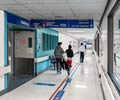Nearly 50,000 US medical patients die every year of blood poisoning or pneumonia they picked up in hospital, a study published Monday shows.
Nearly 50,000 US medical patients die every year of blood poisoning or pneumonia they picked up in hospital, a study published Monday shows.
Hospital-acquired sepsis and pneumonia in 2006 claimed 48,000 lives, led to 2.3 million extra patient-days in hospital and cost 8.1 billion dollars, according to the study, led by researchers from the Center for Disease Dynamics, Economics and Policy at Washington-based Resources for the Future.Together, the two hospital-acquired infections -- also called nosocomial infections -- account for about one-third of the 1.7 million infections US patients pick up every year while in hospital, the study published in the Archives of Internal Medicine shows.
They are also responsible for nearly half of the 99,000 deaths a year from hospital-acquired infections reported by the Centers for Disease Control and Prevention (CDC).
The study found that patients who underwent invasive surgery during their initial hospitalization were more likely to pick up a secondary infection while in hospital, and elective surgery patients were at even higher risk of nosocomial infection.
Using the largest database of hospital records in the United States, which covered hospital discharges in 40 states, the researchers estimated that 290,000 patients in US hospitals picked up sepsis, or blood poisoning, during their hospitalization in 2006, and 200,000 developed pneumonia.
Hospital-acquired pneumonia extended a patient's stay in hospital by 14 days and added some 46,400 dollars to the final price tag, while sepsis extended the time spent in hospital by nearly 11 days and added 32,900 dollars on average to the final bill.
Advertisement
In a commentary piece also published in the Archives of Internal Medicine, two critical care doctors deplored "the magnitude of harm from these infections" and said it was "unconscionable" that patients "continue to experience harm from their interactions with the health system."
Advertisement
"We have invested little in rigorous methods to measure and improve quality of care," they wrote.
Source-AFP
SRM










